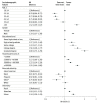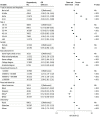Trust in Physicians and Hospitals During the COVID-19 Pandemic in a 50-State Survey of US Adults
- PMID: 39083270
- PMCID: PMC11292455
- DOI: 10.1001/jamanetworkopen.2024.24984
Trust in Physicians and Hospitals During the COVID-19 Pandemic in a 50-State Survey of US Adults
Abstract
Importance: Trust in physicians and hospitals has been associated with achieving public health goals, but the increasing politicization of public health policies during the COVID-19 pandemic may have adversely affected such trust.
Objective: To characterize changes in US adults' trust in physicians and hospitals over the course of the COVID-19 pandemic and the association between this trust and health-related behaviors.
Design, setting, and participants: This survey study uses data from 24 waves of a nonprobability internet survey conducted between April 1, 2020, and January 31, 2024, among 443 455 unique respondents aged 18 years or older residing in the US, with state-level representative quotas for race and ethnicity, age, and gender.
Main outcome and measure: Self-report of trust in physicians and hospitals; self-report of SARS-CoV-2 and influenza vaccination and booster status. Survey-weighted regression models were applied to examine associations between sociodemographic features and trust and between trust and health behaviors.
Results: The combined data included 582 634 responses across 24 survey waves, reflecting 443 455 unique respondents. The unweighted mean (SD) age was 43.3 (16.6) years; 288 186 respondents (65.0%) reported female gender; 21 957 (5.0%) identified as Asian American, 49 428 (11.1%) as Black, 38 423 (8.7%) as Hispanic, 3138 (0.7%) as Native American, 5598 (1.3%) as Pacific Islander, 315 278 (71.1%) as White, and 9633 (2.2%) as other race and ethnicity (those who selected "Other" from a checklist). Overall, the proportion of adults reporting a lot of trust for physicians and hospitals decreased from 71.5% (95% CI, 70.7%-72.2%) in April 2020 to 40.1% (95% CI, 39.4%-40.7%) in January 2024. In regression models, features associated with lower trust as of spring and summer 2023 included being 25 to 64 years of age, female gender, lower educational level, lower income, Black race, and living in a rural setting. These associations persisted even after controlling for partisanship. In turn, greater trust was associated with greater likelihood of vaccination for SARS-CoV-2 (adjusted odds ratio [OR], 4.94; 95 CI, 4.21-5.80) or influenza (adjusted OR, 5.09; 95 CI, 3.93-6.59) and receiving a SARS-CoV-2 booster (adjusted OR, 3.62; 95 CI, 2.99-4.38).
Conclusions and relevance: This survey study of US adults suggests that trust in physicians and hospitals decreased during the COVID-19 pandemic. As lower levels of trust were associated with lesser likelihood of pursuing vaccination, restoring trust may represent a public health imperative.
Conflict of interest statement
Figures




References
-
- U.S. Preventive Services Task Force . Counseling about proper use of motor vehicle occupant restraints and avoidance of alcohol use while driving: U.S. Preventive Services Task Force recommendation statement. Ann Intern Med. 2007;147(3):187-193. doi:10.7326/0003-4819-147-3-200708070-00008 - DOI - PubMed
Publication types
MeSH terms
Grants and funding
LinkOut - more resources
Full Text Sources
Medical
Research Materials
Miscellaneous

